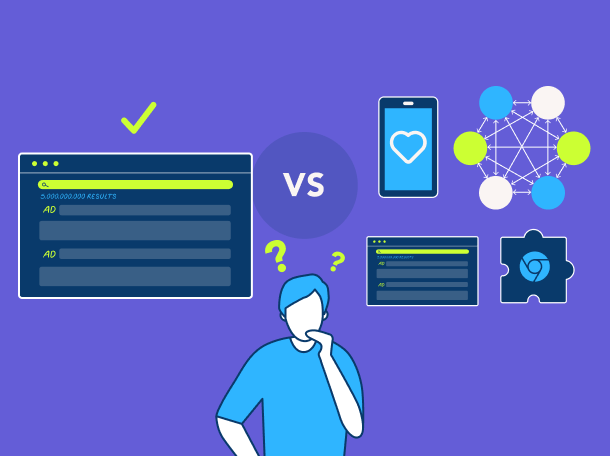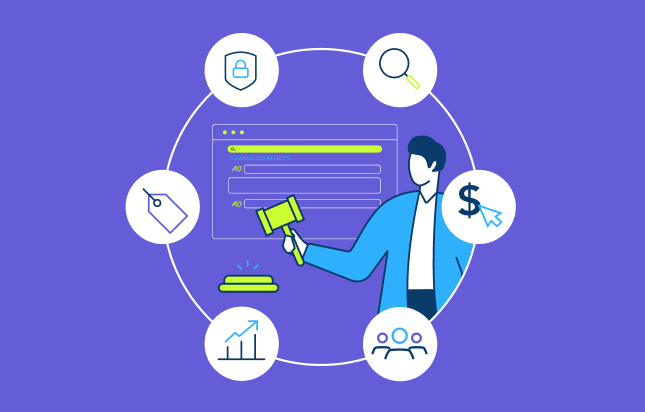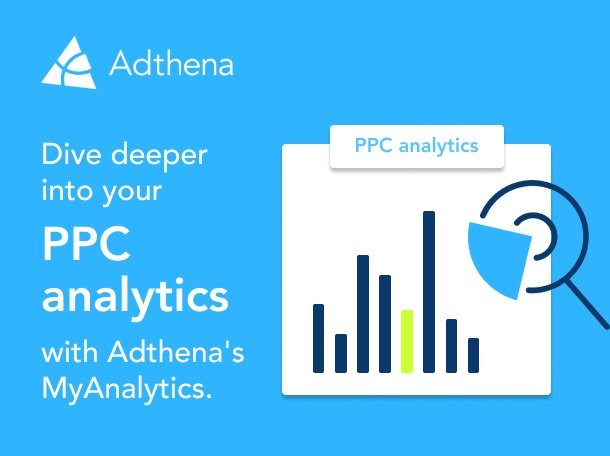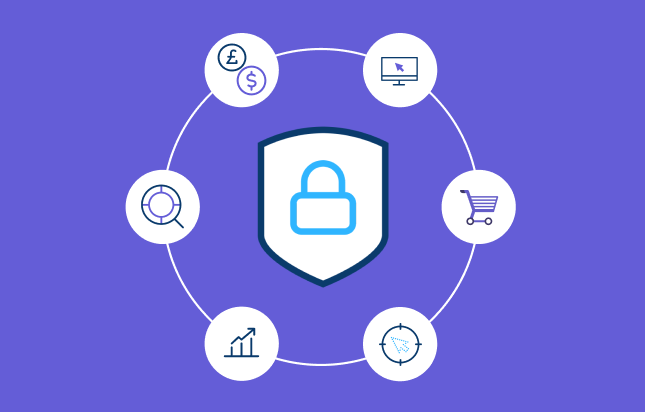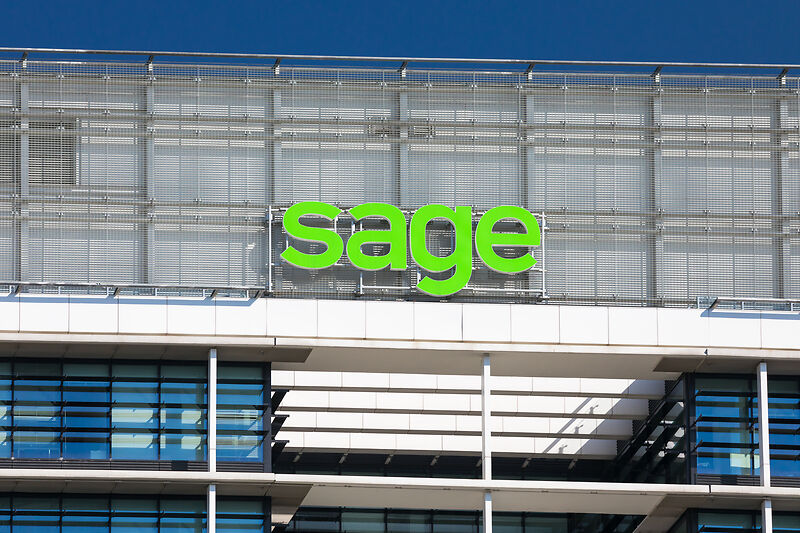In this blog we explore the difference between search intelligence data and panel data. We compare Adthena’s data, which is sourced solely from Google and means it’s highly-relevant and Panel data, which comes from multiple different sources to form a large database, meaning some of it may not be relevant.
Read on for the full breakdown.
What is Search Intelligence Data?
About Adthena’s search intelligence data
Adthena’s patented Whole Market View technology queries the Google Search results page and indexes all paid and organic results, as well as Google Shopping results, into our database of learning models. The high frequency data collection happens across tens of thousands of queries per Google Ads advertiser.
There are no privacy concerns with this search intelligence data because the search results are all publicly available and are not collected from individuals’ signed-in Google accounts.
Our AI models help our enterprise customers understand market trends, threats, ad copy and estimated CPCs in the Google auction. These models are also supported by data from Google Keyword planner to enrich our insights.
What is Panel Data?
Adthena does not use Panel data. Panel data is created via multiple data sources to build a ‘proxy view’ of user behaviour:
- App data shared from partners, such as a Dating App.
- Website 1st party data shared from partners, such as Link Farms or Spam Content in organic.
- Some collection of data on the Google SERP on key top terms with a 72 hour lag.
- Google Chrome browser extensions which track individual user movements. Data from Chrome extensions largely exist on desktop which creates issues with understanding mobile search patterns.
App panel data collection raises privacy concerns. Users are not always clearly informed about what data is being collected, how it’s used, and how their privacy is protected.
Models extrapolated from panel data can fail to build a clear picture, and often relay a lagged view of events.
What are the different solutions in the market today?
Adthena is the only solution on the market today that delivers search intelligence on Google Ads purely for enterprise advertisers, without using any panel data. SEMrush and SimilarWeb are two Panel Data-based solutions on the market that provide search engine results page data as part of an ‘insights’ mix of various channels.
How accurate is Panel Data vs Search Intelligence Data?
Data from both sources is never going to be 100% accurate as there are too many variables for every advertiser and their unique account performance. Adthena’s data, which ingests Google’s keyword planner into its learning models, is certainly more accurate.
Advertisers need the broadest set of data that offers a close to real time view of what’s happening in their relevant Google Ads auctions. Adthena focuses just on Google Ads, which is often the largest channel for digital spend, whereas the Panel Data that other solutions use will be a proxy view combined with a mixture of sources to replicate a view of user behaviour.
Adthena (Search Intelligence Data) vs. Similarweb (Panel Data): Key differentiation points
While both Adthena and Similarweb offer valuable insights into the digital world, they cater to different needs with the distinct strengths below:
Adthena
Focus: Search intelligence and competitive advertising insights
Strengths
- Whole Market View (WMV): Your WMV is automatically built around all relevant search terms in your market using AI. This provides a comprehensive view of competitor activity and hidden opportunities, which can also be segmented by those terms. (Similarweb customers will need to upload their own terms and group them, meaning they miss terms they haven’t supplied themselves. These lists have to be updated manually which means there is a risk they could become out of date or ‘stale’
- Custom-built AI: Tailored models for each customer, ensuring insights are relevant to your specific market dynamics.
- GenAI with Arlo chatbot: Provides real-time insights from massive datasets through plain language conversation including metrics by ad format (Similar Web cannot do this)
- Free connectors and reporting: Adthena offers a free Looker connector, whereas SimilarWeb requires an external paid-for tool like Funnel or Supermetrics to enable the same functionality and reporting. SimilarWeb also charge for raw API usage via data credits.
Similarweb
Focus: Comprehensive digital traffic measurement & market intelligence
Strengths
- Vast data collection: Analyzes a wider range of data sources (website analytics, user panels, public data) for a holistic view of online traffic.
- Global market reach: Provides insights for websites and apps across 190 countries and 210 categories.
- Traffic intelligence: Offers data on website visits, demographics, user behavior, and competitive landscape.
In conclusion
- Choose Adthena: for a laser focus on Google Ads search advertising and comprehensive competitor analysis.
- Choose Similarweb: for a broader view of online traffic across a wider range of digital properties and global markets, and if you’re not worried about being able to take action.
Adthena vs. Semrush data: A focused comparison
Adthena vs. Semrush data: A focused comparison
Here’s a breakdown of how Adthena and Semrush differ in terms of the data they provide below.
Adthena
Focus: Search intelligence and competitive advertising insights
Strengths
- Data provided: Paid search insights: competitor keywords, ad copy, landing pages, budgets, bids.
- Organic search insights: competitor ranking for relevant search terms.
- Market share analysis
- Brand protection for paid search
Semrush
Focus: All aspects of Digital Marketing (SEO, PPC, Content, Social Media) with focus on SEO
Strengths
- SEO-focused Data Provided (much broader than Adthena)
- Keyword rankings and analytics (organic and paid)
- Website traffic data (desktop/mobile, sources)
- Backlink analysis
- Visitor engagement metrics
- Social media engagement and traffic
- Brand mentions
- Global search engine volatility data (industry-specific)
Key Differences
- Scope: Adthena focuses specifically on search advertising data, while Semrush offers a suite of data across all digital marketing channels. Most Semrush customers use it for SEO and don’t see it as a paid search tool, although certain features make it look and feel like it is. Semrush’s accuracy on paid search could be caused by low frequency of updates. SEMrush limits PLA up to 50,000 results vs Adthena’s coverage is up to 150k pages. Additionally SEMRush charges for their raw API data.
- Competitor insights: Both provide competitor data, but Adthena drills deeper into paid search strategies (ad copy, keywords, budgets), whereas Semrush offers a more general view of competitor performance across SEO, social media, and content marketing.
Search engine coverage: Semrush offers limited support for search engines beyond Google (Baidu at a national level, Bing/Yandex with estimations). Adthena is primarily focused on Google Ads data.
What's the best choice for me?
Choosing between them
- Choose Adthena: For in-depth paid search intelligence and competitor analysis, especially for Google Ads: Adthena is a strong choice.
- Choose Semrush: For a broader view of digital marketing performance, including SEO, content, social media, and website traffic: Semrush provides a more comprehensive solution.
The question for advertisers is this: would you like observed-directional data on your primary channel (like Adthena) or a broad set of signals based on a mixture of marketing channels (like SEMRush or Similarweb)?
Adthena shows a much deeper level of coverage on more terms than Similarweb by automatically building a Whole Market View around a customer’s terms, which factors in terms that the customer’s competition are appearing on. With Similarweb you have to supply your own terms.
Read more about Adthena’s data or see it in action by requesting a demo.
